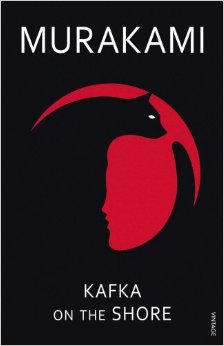
Kafka on The Shore
(I want my time back)
Franz Kafka is one of my favorite authors, but also, in my opinion, a bit difficult to read. After finishing the Metamorphosis I deeply regretted the time I spent reading such a boring book. Until a few days later when it suddenly hit me how amazing the book and Franz Kafka really are. I proceeded reading all of his books and they all had that same ‘delayed gratification’ effect.
I read a few short stories and What I Talk About When I Talk About Running by Haruki Murakami, before I decided to give Kafka on The Shore a try. The famous author, the positive reviews and the fact that the title of the book has the name of my favorite author increased my expectations of the book. However, I ended up deeply disappointed. Kafka on The Shore was incredibly boring and annoying to read and it had the opposite of a ‘delayed gratification’ effect. As time goes by my hate towards this book only grows…
Kafka on The Shore was so boring that it took me about an year to finish. It left a lingering feeling of pain, emptiness and dullness, which made me quit Murakami forever. To start with, all the characters in the book have a two-dimensional feeling to them. I never cared about any of the characters, not even the kind, crazy, old, cat man. Moreover, at times the book feels absurd just for the sake of being absurd. The author tries really hard to give us the feeling of “dream-logic” but comes no near to the brilliant way that Kafka does it…
Many of you have probably experienced waking up after a dream only to realize that you were following some weird “dream laws” in your sleep? And these laws were all incredibly absurd, yet you felt the urge to abide by them. Then you wake up and wonder how come you never realized that you were dreaming… And how come you didn’t have the will to break free from the grip of that dream and shape your dream world the way you want it to be==> Reading Franz Kafka feels the same way. You become more aware of the absurd rules and laws that you follow in your real, waking life, which are often a product of social expectations, fear and upbringing. Franz Kafka made me more aware of who I am and freed me in many ways…
We then take a look at the ‘dream-logic’ in ‘Kafka on the shore’. I can best describe it as being aware that you are asleep and fully conscious of the absurdity of your dreams but still stuck in them until you wake up. Or to put it another way, fully aware of how boring the book is but stuck reading it…
If anyone found meaning and derived value from this book please share in the comments below. I am curious about the way you see it.
Quotes
“You have to look!” Johnnie Walker commanded. “That’s another one of our rules. Closing your eyes isn’t going to change anything. Nothing’s going to disappear just because you can’t see what’s going on. In fact, things will be even worse the next time you open your eyes. That’s the kind of world we live in, Mr. Nakata. Keep your eyes wide open. Only a coward closes his eyes. Closing your eyes and plugging up your ears won’t make time stand still.”
“Narrow minds devoid of imagination. Intolerance, theories cut off from reality, empty terminology, usurped ideals, inflexible systems. Those are the things that really frighten me. What I absolutely fear and loathe.”
“That’s fine. Look—what I’m getting at is no matter who or what you’re dealing with, people build up meaning between themselves and the things around them. The important thing is whether this comes about naturally or not. Being bright has nothing to do with it. What matters is that you see things with your own eyes.”
“”That’s why I gave myself the name Kafka. That’s what Kafka means in Czech, you know—crow.” “Hmm,” she says, mildly impressed. “So you’re Crow.” “That’s right,” I say. That’s right, the boy named Crow says. “There must be a limit to that kind of lifestyle, though,” she says. “You can’t use that strength as a protective wall around you. There’s always going to be something stronger that can overcome your fortress. At least in principle.” “Strength itself becomes your morality.” Miss Saeki smiles. “You catch on quickly.” “The strength I’m looking for isn’t the kind where you win or lose. I’m not after a wall that’ll repel power coming from outside. What I want is the kind of strength to be able to absorb that outside power, to stand up to it. The strength to quietly endure things—unfairness, misfortune, sadness, mistakes, misunderstandings.” “That’s got to be the most difficult strength of all to make your own.””
“”Myoga, you’re not very bright, so you don’t have to learn any sutras. Instead, I’d like you to sit at the entrance and polish everybody’s shoes.” Myoga was an obedient guy, so he didn’t tell his master to go screw himself. So for ten years, twenty years, he diligently polished everybody’s shoes. Then one day he achieved enlightenment and became one of the greatest of all the Buddha’s followers. That’s a story Hoshino always remembered, because he’d thought that had to be the crappiest kind of life, polishing shoes for decades. You gotta be kidding, he thought. But when he considered it now, the story started to take on a different undertone. Life’s crappy, no matter how you cut it. He just hadn’t understood that when he was little.”